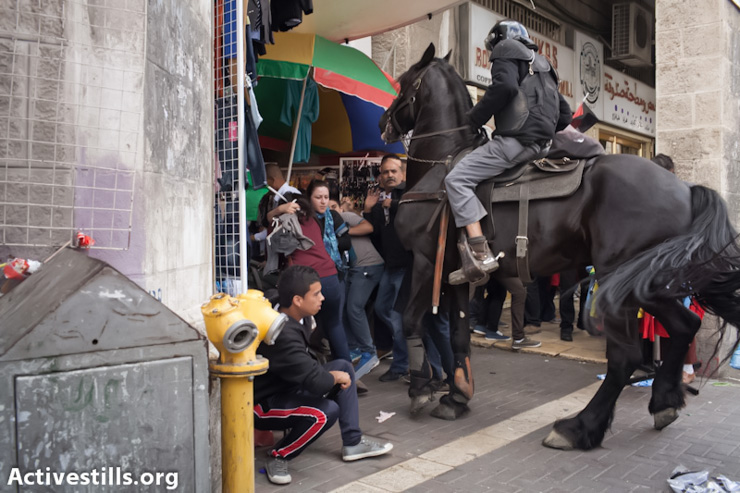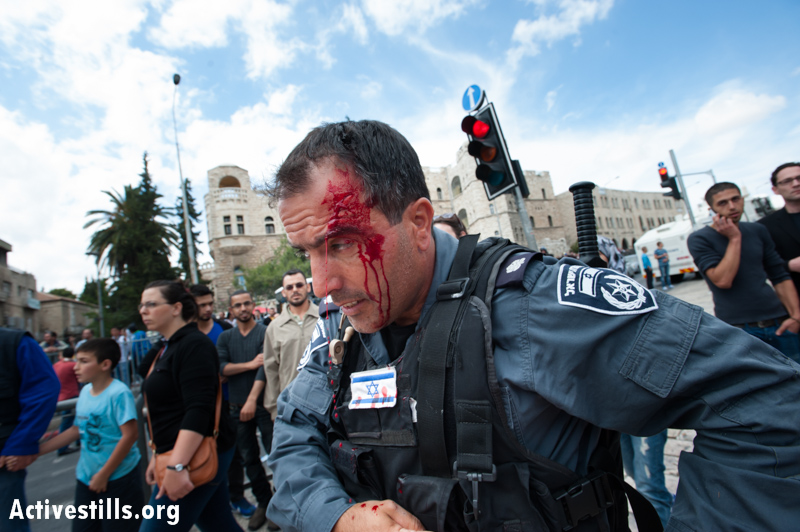
Palestinian activist Mazzen Al-Azzah confronts Israeli soldiers blocking a march toward the Green Line near the village of Husan, West Bank, May 14, 2013. Al-Azzah was later arrested and falsely accused of throwing stones and assaulting soldiers. (Photo by: Ryan Rodrick Beiler/Activestills.org)
As Noam Sheizaf’s recent headline states, “the Nakba’s memory is more present than ever in Israel.” The Nakba, literally, “the catastrophe,” is the name given to the massive deportation of more then 700,000 Palestinians from what became the State of Israel in 1948. Sheizaf goes on to point out how efforts, such as the “Nakba law,” which authorizes the finance minister to withdraw funds from organizations commemorating the day, have backfired and effectively injected Nakba consciousness into the global discourse.
From Tel Aviv to Jerusalem and throughout the West Bank and Gaza, activists marched to assert a history which is no longer disputed by Israeli historians such as Benny Morris, who despite his shift to the right, still acknowledges that “in the case of Israel, the moment of its birth was also the moment of the destruction and wholesale displacement of Palestinian society.”
For more resources on Nakba history, visit the Zochrot (Israeli organization dedicated to raising awareness on the Nakba) website, or the website of the Palestinian NGO Badil.

Right-wing protesters wave Israeli flags as they demonstrate against a ceremony commemorating the Nakba that was held by Palestinian and Israeli students in the entrance to the Tel Aviv University. The event took place under heavy police presence, May 13, 2013. (Photo by: Oren Ziv/Activestills.org)

Palestinians march with torches through the streets of Bethlehem to commemorate the Nakba, May 14, 2013. (Photo by: Ryan Rodrick Beiler/Activestills.org)

Palestinian activists march on Road 60, the main north-south route through the West Bank, in a Nakba Day protest, May 15, 2013. (Photo by: Anne Paq/Activestills.org)

Palestinian activists commemorate Nakba Day by planting trees in the Ahfad Younis neighborhood of Bab Al-Shams protest village site in E1, May 15, 2013. The Israeli settlement Maale Adumim, illegal under international law, covers a nearby hilltop. (Photo by: Ryan Rodrick Beiler/Activestills.org)

A Palestinian youth uses a slingshot during clashes with the Israeli army during a protest to commemorate the Nakba, outside the Ofer military prison, West Bank, May 15, 2013. (Photo by:Yotam Ronen/Activestills.org)

Israeli border policemen arrest a Palestinian man during protests commemorating Nakba Day at Damascus Gate, East Jerusalem, May 15, 2013. (Photo by: Ryan Rodrick Beiler/Activestills.org)

A mounted Israeli policeman charges Palestinian crowds during protests commemorating Nakba Day at Damascus Gate, East Jerusalem, May 15, 2013. (Photo by guest photographer: Tali Mayer/Activestills.org)

An Israeli policeman kicks a fleeing Palestinian woman as riot forces charge into crowds during Nakba Day protests at Damascus Gate, East Jerusalem, May 15, 2013. The Nakba, literally, the “catastrophe”, names the massive deportation of more then 700,000 Palestinian, made refugees and driven out of what became the State of Israel in 1948. (Photo by: Ryan Rodrick Beiler/Activestills.org)

An Israeli policeman bleeds from an injury sustained attempting to eject Palestinians commemorating Nakba Day at Damascus Gate, East Jerusalem, May 15, 2013. According to Haaretz, “In Jerusalem, two policemen were lightly injured when Palestinian protesters threw stones. Two ultra-Orthodox men were lightly injured when they were beaten by Palestinians.” (Photo by: Ryan Rodrick Beiler/Activestills.org)

Members of the media take cover behind a Palestinian Red Crescent ambulance targeted by Israeli water canons during Nakba Day protests near Damascus Gate, East Jerusalem, May 15, 2013. (Photo by: Anne Paq/Activestills.org)

Israeli police arrest a Palestinian man during protests commemorating Nakba Day at Damascus Gate, East Jerusalem, May 15, 2013. (Photo by: Ryan Rodrick Beiler/Activestills.org)
Read more:
Remembering the Nakba, understanding this is a shared land
Report: Forced displacement on both sides of the Green Line
The Nakba: Addressing Israeli arrogance
The Palestinian Nakba: Are Israelis starting to get it?
Despite efforts to erase it, the Nakba’s memory is more present than ever in Israel
Subscribe to The Landline
+972's weekly newsletter













